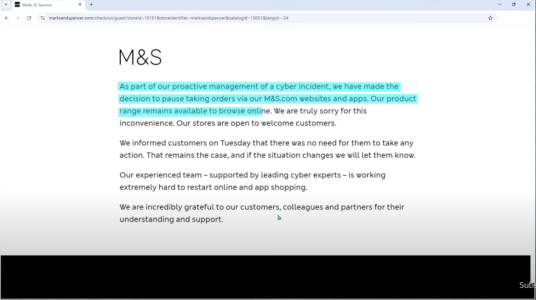Are US shops the next target? Google warns of cybercrime wave crippling retailers
- Replies 0
If you’ve been following the news from across the pond, you may have noticed a troubling trend: some of the United Kingdom’s most beloved retailers have been brought to their knees by a new wave of cyberattacks.
Now, according to Google’s top security experts, the same hackers are setting their sights on major American brands—and that means US shoppers could soon feel the impact.
What’s Happening? A Cybercrime Spree Goes Global
In recent weeks, at least three of Britain’s retail giants—Marks & Spencer, the Co-op Group, and Harrods—have been hit by a series of destructive, financially motivated cyberattacks.
The fallout has been dramatic: Marks & Spencer was forced to halt online orders for weeks, the Co-op Group had “huge amounts of customer and employee data” stolen, and Harrods had to restrict internet access in its stores.
Now, Google’s Threat Intelligence Group is sounding the alarm. “Major American retailers have already been targeted,” John Hultquist, the group’s chief analyst, told NBC News.
While he declined to name specific companies, the warning is clear: the same cybercriminals who crippled British retailers are now going after big US brands.

How Do These Attacks Work?
The hackers’ weapon of choice is ransomware—a type of malicious software that locks up a company’s computer systems and steals sensitive information.
The criminals then demand a ransom payment, threatening to leak the data or keep the systems offline unless they’re paid. They even contacted BBC to provide evidence of the customer and employee data they have stolen from the Co-op Group.
This isn’t just a British problem. Last year, a similar attack shut down parts of some of Las Vegas’s most famous casinos.
MGM Resorts, which owns the Bellagio and Mandalay Bay, had to close casino floors and left guests locked out of their rooms. Caesars Entertainment was also hit, but quickly paid the ransom and avoided widespread chaos.
Also read: Is your water safe? Inside the cyberattack that has America on alert!
What’s especially alarming is that these attacks are the work of a loosely affiliated group of young, English-speaking hackers working in tandem with a Russian-speaking cybercrime gang.
This collaboration has proven devastatingly effective, giving them the skills and resources to breach even the most well-defended companies.
Why Retailers? And Why Now?
You might wonder: why are hackers targeting retailers? The answer is simple—retailers hold a treasure trove of valuable data.
From credit card numbers and addresses to employee records and loyalty program details, a successful breach can yield a massive payday for cybercriminals.
It’s not yet clear if there’s a specific technical vulnerability in the retail industry, or if hackers are simply following the money.
But as more shopping moves online and retailers rely on complex digital systems, the opportunities for cybercrime have never been greater.
Source: WION / Youtube.
What Are US Retailers Doing to Protect Themselves?
The National Retail Federation, which represents thousands of companies including Walmart and Target, says American retailers are taking the threat seriously.
“Many companies have taken steps to harden themselves against these criminal groups’ tactics over the past two years,” said Christian Beckner, the NRF’s vice president of retail technology and cybersecurity.
Also read: Health insurance data hack hits millions—here’s how to protect yourself
Source: Sky News / Youtube.
Big tech companies like Google are also playing a key role, providing cloud storage, networking, and security protections to help retailers defend against attacks. But as the hackers’ tactics evolve, the battle is far from over.
Aside from these attacks, the US has also been vulnerable to cyberattacks in the healthcare sectors. Hospitals such as Yale New Haven Health and Community Health Center detected “unusual activity” within its IT systems earlier this year.
How Can You Protect Yourself?
While retailers and tech companies work to shore up their defenses, there are steps you can take to stay safe:
1. Monitor your accounts: Regularly check your bank and credit card statements for suspicious activity.
2. Use strong, unique passwords: Don’t reuse passwords across different sites, and consider using a password manager.
3. Be wary of unusual emails or calls: If you receive a message claiming to be from a retailer about a recent breach, don’t click on any links or provide personal information. Contact the company directly using a trusted phone number or website.
4. Enable two-factor authentication: Many retailers now offer this extra layer of security for your online accounts.
Read next: Older Americans impacted as T-Mobile settlement hits delay—here’s how to protect your info

Have you ever been affected by a data breach or cyberattack? Do you have tips for staying safe online, or questions about how to protect your information? Share your experiences and advice in the comments below!
Now, according to Google’s top security experts, the same hackers are setting their sights on major American brands—and that means US shoppers could soon feel the impact.
What’s Happening? A Cybercrime Spree Goes Global
In recent weeks, at least three of Britain’s retail giants—Marks & Spencer, the Co-op Group, and Harrods—have been hit by a series of destructive, financially motivated cyberattacks.
The fallout has been dramatic: Marks & Spencer was forced to halt online orders for weeks, the Co-op Group had “huge amounts of customer and employee data” stolen, and Harrods had to restrict internet access in its stores.
Now, Google’s Threat Intelligence Group is sounding the alarm. “Major American retailers have already been targeted,” John Hultquist, the group’s chief analyst, told NBC News.
While he declined to name specific companies, the warning is clear: the same cybercriminals who crippled British retailers are now going after big US brands.

Hackers behind recent destructive cyberattacks on major UK retailers are now targeting large American brands, according to Google’s Threat Intelligence Group. Image source: WION / Youtube.
How Do These Attacks Work?
The hackers’ weapon of choice is ransomware—a type of malicious software that locks up a company’s computer systems and steals sensitive information.
The criminals then demand a ransom payment, threatening to leak the data or keep the systems offline unless they’re paid. They even contacted BBC to provide evidence of the customer and employee data they have stolen from the Co-op Group.
This isn’t just a British problem. Last year, a similar attack shut down parts of some of Las Vegas’s most famous casinos.
MGM Resorts, which owns the Bellagio and Mandalay Bay, had to close casino floors and left guests locked out of their rooms. Caesars Entertainment was also hit, but quickly paid the ransom and avoided widespread chaos.
Also read: Is your water safe? Inside the cyberattack that has America on alert!
What’s especially alarming is that these attacks are the work of a loosely affiliated group of young, English-speaking hackers working in tandem with a Russian-speaking cybercrime gang.
This collaboration has proven devastatingly effective, giving them the skills and resources to breach even the most well-defended companies.
Why Retailers? And Why Now?
You might wonder: why are hackers targeting retailers? The answer is simple—retailers hold a treasure trove of valuable data.
From credit card numbers and addresses to employee records and loyalty program details, a successful breach can yield a massive payday for cybercriminals.
It’s not yet clear if there’s a specific technical vulnerability in the retail industry, or if hackers are simply following the money.
But as more shopping moves online and retailers rely on complex digital systems, the opportunities for cybercrime have never been greater.
Source: WION / Youtube.
What Are US Retailers Doing to Protect Themselves?
The National Retail Federation, which represents thousands of companies including Walmart and Target, says American retailers are taking the threat seriously.
“Many companies have taken steps to harden themselves against these criminal groups’ tactics over the past two years,” said Christian Beckner, the NRF’s vice president of retail technology and cybersecurity.
Also read: Health insurance data hack hits millions—here’s how to protect yourself
Source: Sky News / Youtube.
Big tech companies like Google are also playing a key role, providing cloud storage, networking, and security protections to help retailers defend against attacks. But as the hackers’ tactics evolve, the battle is far from over.
Aside from these attacks, the US has also been vulnerable to cyberattacks in the healthcare sectors. Hospitals such as Yale New Haven Health and Community Health Center detected “unusual activity” within its IT systems earlier this year.
How Can You Protect Yourself?
While retailers and tech companies work to shore up their defenses, there are steps you can take to stay safe:
1. Monitor your accounts: Regularly check your bank and credit card statements for suspicious activity.
2. Use strong, unique passwords: Don’t reuse passwords across different sites, and consider using a password manager.
3. Be wary of unusual emails or calls: If you receive a message claiming to be from a retailer about a recent breach, don’t click on any links or provide personal information. Contact the company directly using a trusted phone number or website.
4. Enable two-factor authentication: Many retailers now offer this extra layer of security for your online accounts.
Read next: Older Americans impacted as T-Mobile settlement hits delay—here’s how to protect your info
Key Takeaways
- Hackers behind recent destructive cyberattacks on major UK retailers are now targeting large American brands, according to Google’s Threat Intelligence Group.
- At least three high-profile British retailers, including Marks & Spencer, Co-op Group, and Harrods, have been affected by cyberattacks involving stolen data and service disruptions.
- The National Retail Federation has acknowledged the threat to US retailers and stated that many companies have already taken steps to strengthen their cybersecurity.
- The group responsible uses ransomware to lock systems and steal sensitive information, then demands payment, echoing previous high-impact incidents such as those affecting Las Vegas casinos in 2023.
Have you ever been affected by a data breach or cyberattack? Do you have tips for staying safe online, or questions about how to protect your information? Share your experiences and advice in the comments below!







